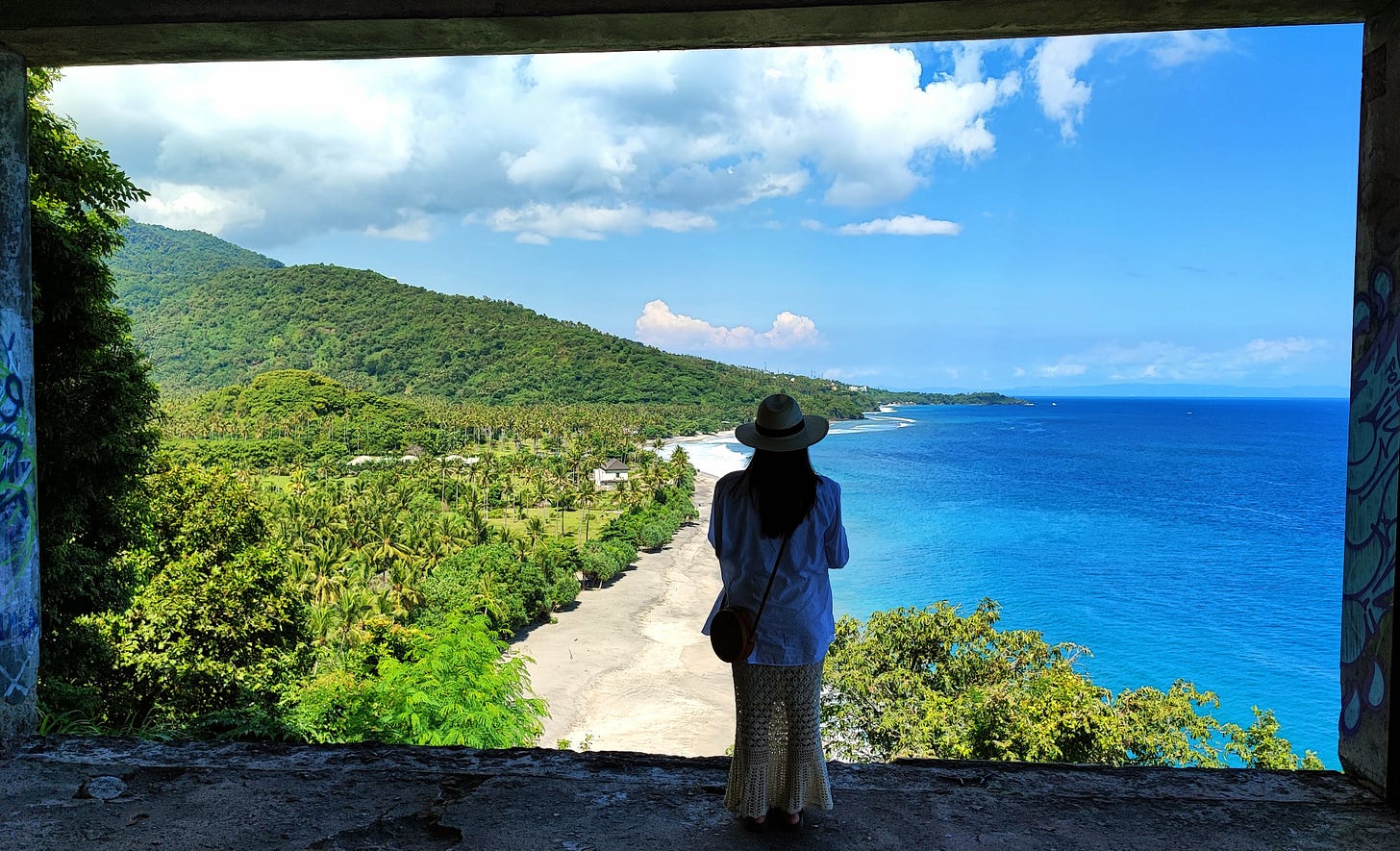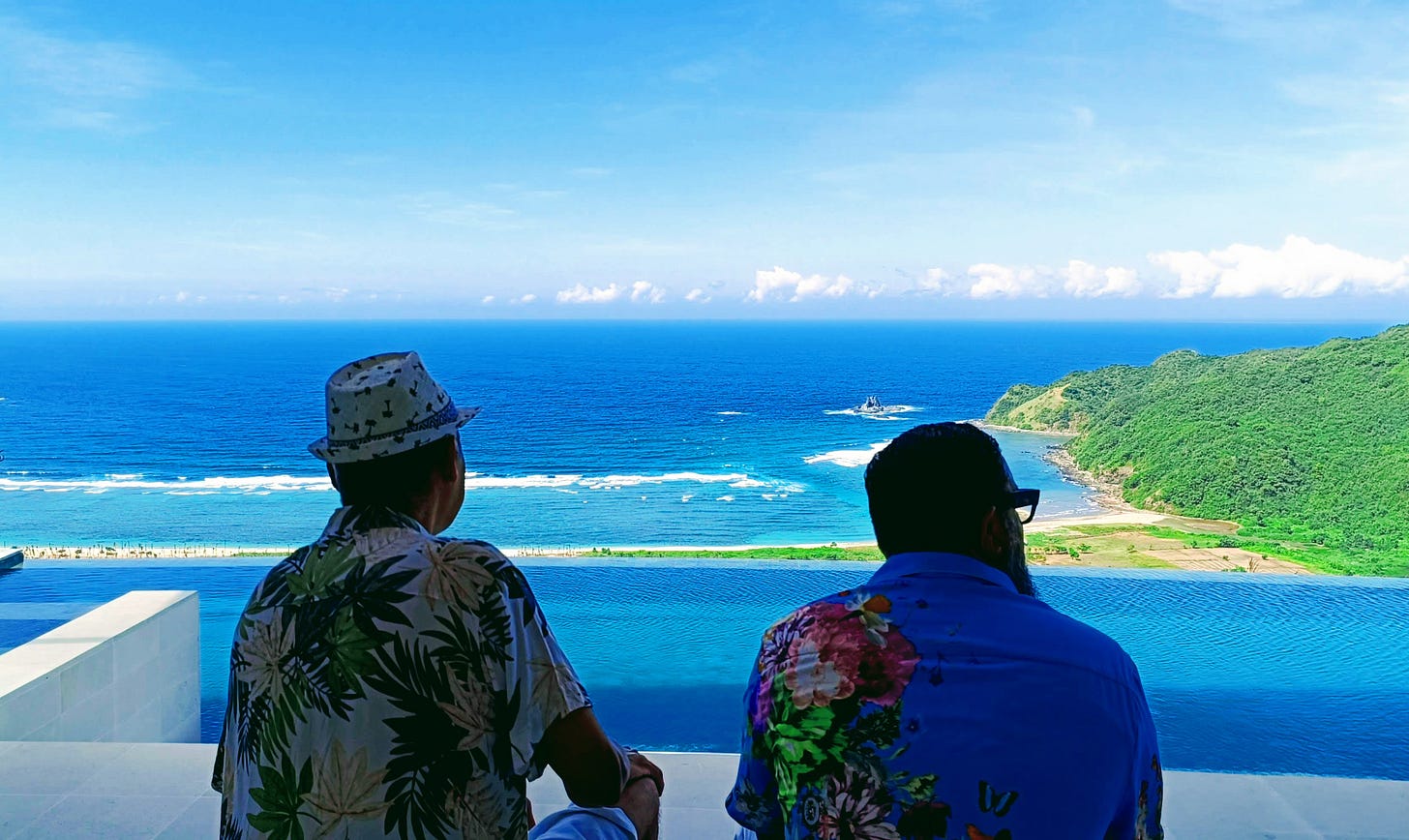I'm heading down the main road from the coastal town of Senggigi to the city of Mataram. The road hugs the land as it winds from one bay to the next, offering awesome views across the Lombok Strait to Bali. At the various lookout points, you’ll find informal food stalls (warungs) with seating set up to enjoy the sunset. As the road moves away from the coast, you enter a more built-up area with formal shops on both sides. Between the shops, you can see rice fields on the left and glimpses of the ocean on the right.
There are many more scooters (motor) than cars (mobil) on the road. The road straightens out, and I end up behind two cars. They’re driving slow—like 40km/hr. The road is narrow, and it’s difficult to overtake with the oncoming traffic.
This is where you learn patience...
When I first arrived on the island of Lombok two years ago, these slow vehicles used to really frustrate me. "Can't you drive faster?" or "Why don't you just move to the side so I can pass?"
Over time, I realized, "You are living on an island. Where are you rushing to?"
I have learned to become a patient driver. I even find myself driving at 40km/hr sometimes, just enjoying the scenery.
That was not my life before.
I grew up in Cape Town, South Africa, a city of about 5 million people. Not a mega-city, but big enough to experience long peak-hour traffic jams every day of the week. When you get into your car, you need to mentally prepare yourself for a road battle.
People rushing to work to clock in on time. Everyone wants to get ahead of the next vehicle. Vehicles constantly switching lanes because they think that the lane next to them is moving faster. When I left Cape Town two years ago, you had to leave home at 6:30 am to avoid traffic; now you need to leave at 6 am.
I remember sitting in early morning meetings and people arriving late saying, "Sorry I got caught in traffic." My standard response: "You weren't sitting in traffic; you were traffic."
Millions of people across the world experience this every working day of the week. One thing you can't tell these people is: "Be patient."
And so this becomes the norm when driving in Cape Town and most big cities. You are rushing to get somewhere. You are watching the clock on your dashboard. Checking Google Maps for traffic congestion- what is your ETA. One incident along your route and your day is buggered.
Constantly against the clock.
Life is different on the island.
The only time you find traffic in Lombok is on a Sunday evening towards sunset. Many young people are on their scooters heading to their favourite sunset viewpoint. Hundreds of scooters heading from Mataram city towards the coastal town of Senggigi.
It got me thinking: Most people in big cities sit in traffic to go and clock in at work. In Lombok, they sit in traffic to go and watch the sunset... Interesting.
Unfortunately, this chase and rush don’t just stop with our driving. It filters into all aspects of our lives. We need to get things done as quickly as possible because we have to move on to the next thing. Rushing to a meeting, picking up children, doing groceries, heading to a function, going to the gym...
Everything we do and consume has to be convenient because we need to get it done as easily and quickly as possible. We have become a society of convenience. We can't warm food on a stove—we need a microwave. And a kettle, a toaster, an air fryer, a deep freezer, an egg boiler, a blender...
We can't hang washing on the line—we need a dryer.
We have created so many things to make our life convenient and faster that it touches every aspect of our lives.
From pre-cooked meals to online check-ins, it's all geared to make our lives more convenient and faster.
But it has also changed our mindset. This is no longer a convenience issue making my life easier; it has become a way of life.
"I placed the pizza order 20 minutes ago, and the delivery guy is not here yet. He is definitely not getting a tip."
“Can you believe it, the train was 7 minutes late this morning? It just messed up my whole day.”
“They said the service would take one hour and my vehicle is still not ready. This is really frustrating.”
And then you move to a place like Lombok.
And it humbles you. No one is interested in your rush. If you want to overtake, you find the gap.
If you have a doctor's appointment, leave earlier. Well, there is no peak-hour traffic, so you will probably be early. And the doctor will probably arrive late.
Life operates at a different pace on a small island.
Pic: Practicing patience with a friend in Lombok
Not just the traffic, but everything. When you go out with friends to a restaurant, the food comes out as each dish is ready, not all together. If they missed your order, you will find out after everyone has received their food. By the time your dish arrives, everyone has already completed their meals. And that's fine, it's really not an issue. You got your food, didn't you?
The only thing that runs on time like clockwork five times a day is the call to prayer (Athaan). When the Athaan is made, people in the village head towards the mosque.
One day, I arrived on time for prayers at the local mosque, and no one was there. That's strange? It turns out the person who makes the Athaan was late. I stood around for about ten minutes, and he arrived. He made the Athaan, and slowly people started arriving for prayers.
I realized that day that the people in the village don't watch a clock for prayer time. They wait for the call to prayer and then head to the mosque. No one was upset that he was late. In fact, I'm not sure that they even knew he was late.
Can you imagine a life without rushing?
A life without constant deadlines.
Just living in the moment.
A life where patience is a virtue. It is possible, as I've discovered.
PS: We don’t have a microwave, but we do have a rice cooker.







"Practicing patience" 💛
Thx, Abbas ☀️🙏